University Launches Global Ethics Program
BY SEAN SMITH CHRONICLE EDITOR
A new, Boston College-based international project unites faculty from different disciplines and institutions on five continents to explore ethical dimensions of critical global issues—including the impact of climate change and the challenges of governance—and their effect on academic, political, and religious communities.
The Program on Global Ethics and Social Trust (GEST), funded by the Office of the Provost and a recent grant from the philanthropic foundation Porticus, has begun a two-year pilot phase that will bring together 10 BC scholars and seven faculty members predominantly from Catholic research universities in Asia, Europe, Africa, and South America in two interdisciplinary working groups: Climate Change and Migration, under the direction of BC Law School Associate Dean for Faculty and Global Practice Katharine Young; and Democracy, Governance, and Education, chaired by Professor of Political Science Jonathan Laurence, director of BC’s Clough Center for the Study of Constitutional Democracy.
The groups will meet three times per
Q&A: Robert Ross
semester during the 2023-2024 and 20242025 academic years and hold a colloquium at the end of each year in June.

GEST is a quintessentially Boston College initiative that puts research and scholarship in service of the wider world, according to founder/principal investigator Vice Provost for Global Engagement James Keenan, S.J., and GEST director Erik Owens, who heads BC’s International Studies Program.
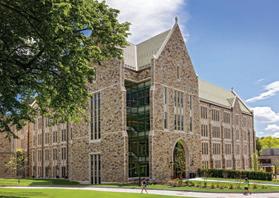
“The question often asked is, ‘How can academics make a meaningful impact on compelling issues of the day?’” said Fr. Keenan, the Canisius Professor and director of the Jesuit Institute at Boston College. “We want the members of these working groups to study and reflect on their respective areas of focus, but most of all to model a form of discourse—global as well as interdisciplinary—that will be of interest not just to institutions of higher education, but the wider public.”
Owens said the program aligns both with BC’s mission and with the call by Jesuit Superior General Arturo Sosa, S.J.—during his appearance at the 2022 Assembly of the International Association
Continued on page 5
China’s Economic Woes
The first half of 2023 delivered a steady stream of bad news for China’s economy: slow growth, record youth unemployment, low foreign investment, weak currency and exports, and a property sector in crisis. Last month, Chinese authorities increased measures to support the renminbi and boost the country’s housing market. Although China has managed numerous difficulties in the past, there is no doubt that the country’s leadership faces a unique set of challenges. To explore these fundamental issues, United States-China relations, and other factors crucial to China’s
future, Chronicle spoke with Professor of Political Science Robert S. Ross, who has visited and studied China extensively.
Q: What are the economic factors contributing to the slowdown in China’s economy? Is China heading toward a recession?
Ross: There is a tendency to expect strong and dramatic Chinese government measures to right the Chinese economy. Yet a more pragmatic approach to economic problems would be a gradual, incremen-
Continued on page 6
Grants program supports “meaningful, intellectual activity.”
Philosophy Chair Bloechl Is Named Fitzgibbons Prof.
BY KATHLEEN SULLIVAN STAFF WRITER

Philosophy Department Chair Jeffrey Bloechl has been appointed to the Albert J. Fitzgibbons Chair in Philosophy, announced Morrissey College of Arts and Sciences Dean Gregory Kalscheur, S.J. Bloechl succeeds Arthur Madigan, S.J., who retired in 2022.
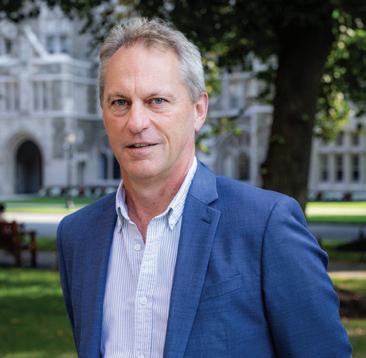
Bloechl, who holds a doctorate from the Catholic University of Louvain (Belgium), has been a member of the Philosophy faculty since 2007. He is a former director of graduate studies in philosophy and is the founding co-director of the University’s joint M.A. program in philosophy and theology. He also co-created the Advanced Research Seminar in Philosophy and Theology, which encourages discussion among graduate students and faculty working in, or with a strong interest in, these two fields.
He specializes in the philosophy of religion, contemporary European philosophy, and the relationship between Christian theology and philosophy. A prominent
Continued on page 7
Page 3
Pops on the Heights Campus event features music by Little Big Town (photo)
Page 8
Schiller Institute
SEPTEMBER 14, 2023 VOL. 31 NO. 2
PUBLISHED BY THE BOSTON COLLEGE OFFICE OF UNIVERSITY COMMUNICATIONS
Page 4 Economics Conference Oct. 6 event will focus on U.S. growth strategies
The Class of 2027 gathered on Linden Lane on September 7 for the First Flight procession, kicking off the annual First Year Academic Convocation, which featured a talk by acclaimed author Tracy Kidder. More photos on page 8.
Ready to Take Flight
photo by lee pellegrini
Jeffrey Bloechl
photo by caitlin cunningham
PUBLISHED BY THE BOSTON COLLEGE OFFICE OF UNIVERSITY COMMUNICATIONS
Around Campus
Some Age-old Advice Is Helpful in Guarding Against Technology Scams
The email promised the Boston College student a great opportunity: a paid internship. But the offer made him suspicious.
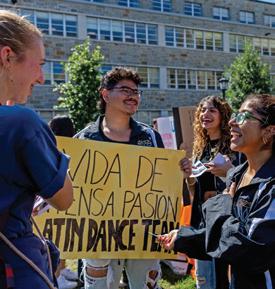
For one thing, although the sender was supposedly a BC faculty member, the message came via Gmail.com, not a bc.edu address. What’s more, the supposed internship would involve the graduate student buying a gift card as part of the alleged professor’s work.
What the bogus email’s author didn’t know was that the graduate student in question happened to be Boston College Police Lt. Jeffrey Postell, who is something of an expert on scams.
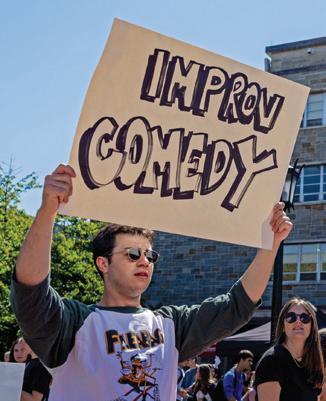
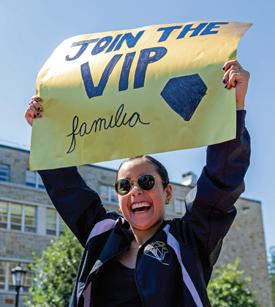
Postell contacted the faculty member referenced in the email, and was relieved to learn he had already been in touch with the University’s Information Technology Services about the message attributed to him.
It was a happy outcome, but the episode was only the latest in a never-ending, universal saga: As long as there have been computer users, there have been computer abusers who concoct ways to trick them into sharing personal or financial information—“phishing,” as it’s called. And it falls to people like Postell and his BC Police colleagues, as well as ITS staffers, who have to keep up with the scammers and make sure the University community is as informed as possible about phishing and other dangers.
“It’s certainly not getting any easier,” said Postell. “Obviously, computer-related technology continues to grow more sophisticated, which means that scammers who use it for criminal purposes are upping
their game. But that doesn’t mean the rest of us are helpless.”
Instances of phishing and other computer scams typically increase around the start of a new academic year, according to Postell. Some students are on their own for the first time, and therefore may be less aware of such risks, he explained, but faculty and staff are by no means immune, either.
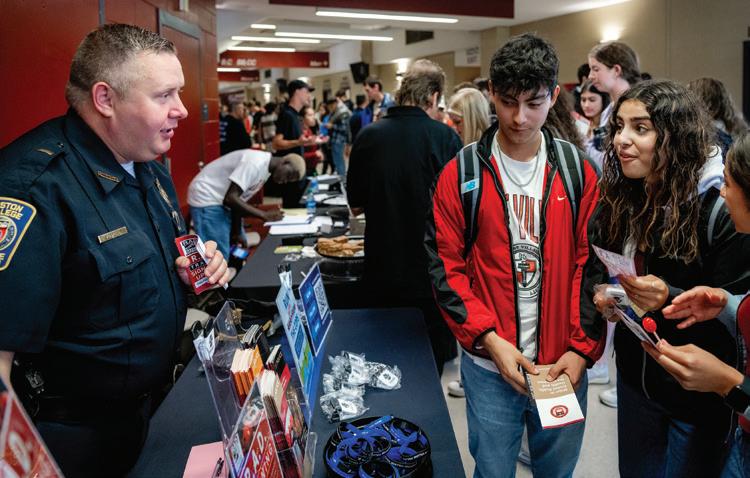
Another typical scam reported to BCPD are phone calls from someone posing as a BC police officer or other law enforcement professional—or a government official or lawyer—who claims that a family member
or friend of the intended target has been arrested or detained and needs bail money (alleged offenses may range from drug possession to outstanding traffic citations to unpaid taxes).
“We will never do that,” said Postell. “BCPD doesn’t call to solicit money from any community members. Nor does any police department.”
What makes such scams appear so unnervingly legitimate is that defrauders may use actual names and can simulate email accounts or phone numbers to make it seem as if they’re the person they claim to be.
“Obviously, those kinds of calls can be very upsetting,” said Postell. “The best thing to do—with any kind of scam—is to slow down and take a breath. Then call into the police department and ask for the duty officer or the officer who supposedly called you, and describe the call you just received. That way you can put your mind at ease and also get an investigation started.”
For scams such as the “paid student internship,” which tout a supposed academic, professional, or financial opportunity, Postell said the old maxim holds true: “If something sounds too good to be true, it probably is.”
“If someone is asking you for, say, your Social Security number—or other personal and financial information—that should be a red flag,” he said. “We don’t want to scare anyone: We just want people to be aware, because the first line of defense with scams is at the user level.”
Vice President for Information Technology Michael Bourque, who lauded Postell and his BCPD colleagues’ work against scams, added that “many technology crimes—from small swindles to very large breaches—often start with a very subtle and seemingly innocent inducement. Many times, the scams involve multiple steps and ramp up after some level of credibility has been established by the scammer. I think Lt. Postell’s advice about slowing down, taking a breath, and remembering that ‘If something sounds too good to be true, it probably is’ is definitely wise.”
—Sean Smith
ASSOCIATE VICE PRESIDENT FOR UNIVERSITY COMMUNICATIONS
Jack Dunn
SENIOR DIRECTOR FOR UNIVERSITY COMMUNICATIONS
Patricia Delaney
EDITOR
Sean Smith
CONTRIBUTING STAFF
Phil Gloudemans
Ed Hayward
Rosanne Pellegrini
Kathleen Sullivan
PHOTOGRAPHERS
Caitlin Cunningham
Lee Pellegrini
www.bc.edu/bcnews chronicle@bc.edu
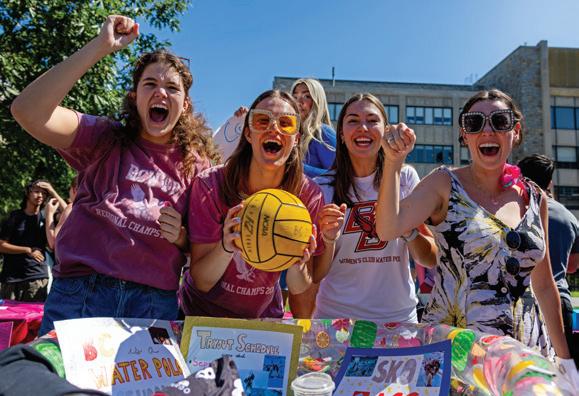
September 14, 2023
The Boston College Chronicle (USPS 009491), the internal newspaper for faculty and staff, is published biweekly from September to May by Boston College, with editorial offices at the Office of University Communications, 3 Lake Street, Brighton, MA 02135 (617)552-3350. Distributed free to faculty and staff offices and other locations on campus. Periodicals postage paid at Boston, MA and additional mailing offices. POSTMASTER: send address changes to The Boston College Chronicle, Office of University Communications, 3 Lake Street, Brighton, MA 02135. A flipbook edition of Chronicle is available via e-mail. Send requests to chronicle@bc.edu.
Chronicle
Boston College Police Lt. Jeffrey Postell, shown at last month’s Job Opportunities Fair, says students and staff alike need to be aware of phishing and other technology-related scams.
BC Scenes Student Involvement Fair
photo by caitlin cunningham
Boston College’s student clubs and organizations turned on the enthusiasm to attract new members at the annual Student Involvement Fair, held September 1 on Stokes Lawn.
photos by caitlin cunningham
2 Chronicle
$2.5M Grant Aids BCSSW Paid Internship Program
BY SEAN SMITH CHRONICLE EDITOR
The Boston College School of Social Work has launched a paid internship program that will match BCSSW students with Boston community-based providers offering behavioral health services to Black and Latinx populations.
A $2.5 million training grant from the Massachusetts Department of Mental Health (DMH) will fund the Behavioral Health Paid Internship Program (BHPIP), which is administered through BCSSW. Professor Rocío Calvo, who is the BCSSW assistant dean for equity, justice, and inclusion and principal investigator for the BHPIP, said the program helps address several critical needs simultaneously. Black and Latinx populations in urban areas are among those most likely to be underinsured or uninsured, she explained, and therefore stand to benefit from publicly funded behavioral health services. Research shows, however, that those services are more effective if they are culturally and linguistically congruent with their target populations—which can be difficult if there is a lack of Black and Latinx behavioral health professionals.
Through the BHPIP, Calvo continued, BCSSW can recruit Black and Latinx students who will work with the agencies as paid interns, creating a mutually beneficial relationship: Students will gain valuable experience for their professional development and credentials, while enabling the provid-
ers to better serve their clients. In addition, the DMH grant enables the school to pay field placement site supervisors from community-based agencies.
Calvo said the BHPIP represents the scaling-up of a model that has already been tested and found to be effective: the school’s Latinx Leadership Initiative (LLI), of which she is the founding director. Through the LLI, students take classes in Spanish and complete their field practice training with Latinx communities in preparation for working with Spanish-speaking
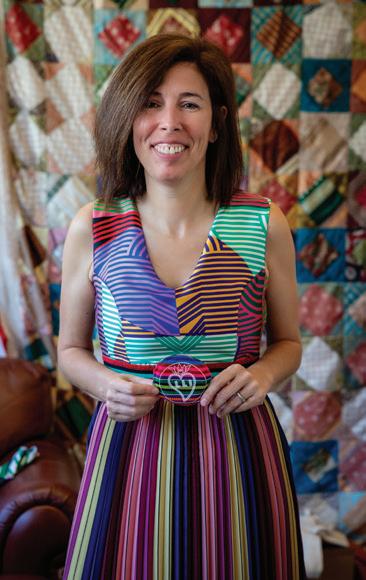
Rocío Calvo: “Being able to pay site supervisors as well as offer stipends for our M.S.W. students is tremendously helpful in affirming our close relationship with behavioral health providers, especially when they are facing one of the worst mental health crises in memory.”
clients using evidence-based interventions. Now in its 10th year, the LLI graduates about 25 students annually.
“The LLI is a model of implementation that’s been tested for a decade, and it works,” said Calvo. “Students develop a nuanced understanding of Latinx populations, the systemic challenges they face in accessing equitable education, social services, and health care, and the most effective interventions to overcome these challenges. The BHPIP builds on the successful approach pioneered through the LLI.
“Being able to pay site supervisors as well as offer stipends for our M.S.W. students is tremendously helpful in affirming our close relationship with behavioral health providers, especially when they are facing one of the worst mental health crises in memory.”
The BHPIP will award non-competitive stipends to eligible students across three M.S.W. cohorts: current students entering their second year of field education, incom-
ing students for their first and second years of field education, and to-be-recruited M.S.W. students for their first year of field education.
The Field Education Office will assess students’ educational and life experience, social work-related experience, learning needs, and career goals, as well as their interest in working with Latinx or Black populations, so as to find the appropriate match for an internship among area behavioral health providers. Calvo said there will be key roles for LLI Assistant Director Ximena Soto; Assistant Dean for Field Education Susan Coleman; Assistant Professor Tyrone Parchment, co-director for the school’s Black Leadership Initiative; and Career Services Director Cindy Snell.
Depending on students’ field of practice, the BHPIP curriculum will be a combination of LLI core courses—including Rethinking Diversity, Systems of Oppression and Privilege, Human Behavior & the Social Environment, and Social Services with Latinx Populations in the United States— with field courses such as Latinx Communities Field of Practice; Afrocentric Field of Practice; Children, Youth, and Families Field of Practice; and Mental Health Field of Practice courses. The BLI/Afrocentric Social Field of Practice Courses are Advanced Practice in Afrocentric Social Work, History of Activism in Black Communities, and Afrocentric Organizations. Both the Children, Youth, and Families and Mental Health fields of practice emphasize traumainformed behavioral health care.
Pops on the Heights Tradition Continues Sept. 29
BY ROSANNE PELLEGRINI STAFF WRITER
A celebrated University tradition, the annual Boston College Pops on the Heights: Barbara and Jim Cleary Scholarship Gala, is once again a sold-out event. A cornerstone event of Family Weekend, the gala—now in its 31st year—will be held on September 29 in Conte Forum.
Pops on the Heights, which features a spectacular line-up of musical performances and entertainment, is co-chaired by University Trustee Sandra M. and Paul B. Edgerley P’24, with fellow board member Patricia L. and Jonathan A. Kraft P’24. This is the third consecutive year that the Krafts have chaired the event, which according to organizers embodies the shared sense of purpose that defines scholarship support at Boston College and shapes the future of hundreds of Eagles each year.
Since 1993, Pops on the Heights—the University’s largest annual fundraiser—has raised more than $130 million for financial aid and helped more than 3,500 students pursue their dream of a BC education.
“Pops on the Heights is such a uniquely BC event, reflecting our passionate community,” said Senior Vice President for University Advancement Andrew Davidson. “It’s fun, it’s festive, but it’s also critical to our financial aid program. BC has a
long tradition of each generation supporting the next, and the Pops is ‘instrumental’ in that tradition.”
Among the performances featured at the gala will be acclaimed country music vocal group Little Big Town, which has earned more than 45 award show nominations and won some 20 awards, including Grammy, Academy of Country Music, Country Music Association, American Music, and Emmy awards. The group’s musical style relies heavily on four-part vocal harmonies, with each member (Karen Fairchild, Phil-
lip Sweet, Kimberly Schlapman, and Jimi Westbrook) alternating as lead vocalists.
Since entering the music scene more than two decades ago, Little Big Town has amassed numerous hit songs and multiple No. 1 singles, including the history-making, best-selling country single of 2015, “Girl Crush,” and Grammy-winning, multi-week No. 1 single, “Better Man.” Little Big Town has released 27 singles and 10 studio albums, including its latest, “Mr. Sun,” which debuted as the Top Country Album by a group in 2022. (For more in-

formation, see LittleBigTown.com.)
Pops on the Heights also features renowned conductor Keith Lockhart leading the Boston Pops Esplanade Orchestra, which has entertained audiences in Boston and beyond for more than 135 years. Since 1995, Lockhart has conducted the group in more than 2,000 concerts, in settings from hospitals to the Super Bowl, and in collaborations with nearly 300 guest artists. Also taking the stage will be the University Chorale of Boston College—a mixed chorus of more than 150 singers that performs both classical and contemporary chorale literature—now under the direction of Riikka Pietiläinen Caffrey, who took the reins following John Finney’s retirement; the “Screaming Eagles” Marching Band, directed by David Healey ’90, Ph.D. ’16; and students Andrew Caden ’24 and Margaret Whyte ’25. Pre-show entertainment includes both individual student performers and campus performance groups.
With a passion for philanthropy, higher education, and the arts, the late Barbara and James F. Cleary ’50, H’93, a BC trustee, founded the annual Pops on the Heights scholarship gala in 1993.Their children—Kara ’84, M.A.’91; Kristin ’89, J.D.’93; and James Jr., P’18 —carry on and honor their legacy as Pops benefactors.
For more on Pops on the Heights, see bc.edu/pops.
September 14, 203
Award-winning country music vocal group Little Big Town will be the featured guest at this year’s Pops on the Heights.
3 Chronicle
photo by caitlin cunningham
Using An Economic Lens on Health Care
New CSON associate dean brings experience as health economist
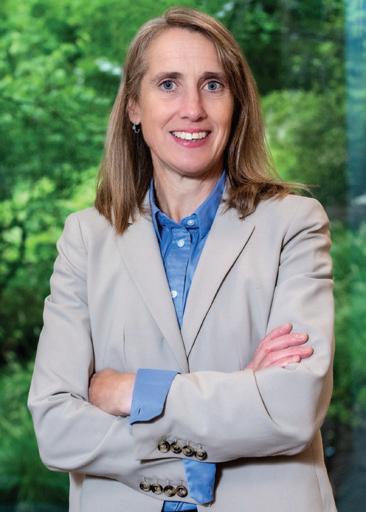 BY JOHN SHAKESPEAR SPECIAL TO THE CHRONICLE
BY JOHN SHAKESPEAR SPECIAL TO THE CHRONICLE
Diana Bowser, a leading health economist who brings 20 years of experience in analyzing health care systems, has joined the Connell School of Nursing as associate dean for research and integrated science. She is among the first health economists on the faculties of schools of nursing in the United States.
Bowser comes to Boston College from the Heller School for Social Policy and Management at Brandeis University, where she directed the doctoral program in social policy. An expert in areas such as health financing, income inequality, and the health care workforce, Bowser has worked with the U.S. and 22 other countries to evaluate health systems and determine how policies impact patients and populations—and where needs could be better met. She holds a bachelor’s degree from Harvard College, a master’s degree in international public health from Yale University, and a doctorate in health economics from the Harvard T.H. Chan School of Public Health.
At the Connell School, she looks forward to continuing her work to improve health systems in collaboration with CSON’s nurses, nurse practitioners, and nurse researchers.
“Nurses are ideal clinical partners for studying health systems in various forms,” Bowser said. “They understand the symptoms at the bedside, and they know why patients are being readmitted, whether they’re facing financial burdens, or why they aren’t taking their medication. With their clinical knowledge, we can think collaboratively about how to make solutions work for entire systems.”
The kinds of issues that Bowser studies—from out-of-pocket hospital and medication costs to the financial impact of dif-
ferent approaches to treating COVID-19 and opioid overdoses—affect billions of people. In the wake of a global pandemic that deepened socioeconomic and racial disparities and strained health care systems around the globe, the Connell School is part of an advance guard of nursing schools that are incorporating health economics into their approach to nursing research and training.
“Assessing the economic impact of nursing care and interventions aimed at improving public health has never been more important,” said Connell School Dean Katherine Gregory. “Including a health economist like Professor Bowser in our interdisciplinary research teams will result in findings that have even greater influence over the future of clinical practice and health outcomes.”
One way in which Bowser believes nurses and NPs can help alleviate economic strain for both patients and health care systems is through preventive care and patient education, which tends to be less costly for all parties than treating active disease after it rears its head.
“To solve the problems we’re facing, I think the way of the future—and the most cost-effective way—is through prevention and primary care, where nurses play a major role,” Bowser said.
For instance, in recent years, she studied the economic and quality-of-life impacts of respiratory syntactical virus (RSV) infections in young children, which led to unprecedented pediatric hospitalization rates
in 2022. This summer, the U.S. government and the Centers for Disease Control and Prevention announced that they would recommend RSV vaccinations for pregnant women and all babies under eight months. Their decision was informed in part by Bowser’s research.
“It’s always nice when something I’m working on does connect with policy change,” she said. “But there’s a lot of work to do, because our health care system in the United States is not primarily focused on prevention. I think that’s a place where CSON has the potential to be at the forefront of finding broader system solutions.”
Bowser is also studying the economic toll of the U.S. opioid epidemic and the costs of treatments such as methadone, as well as the impacts of migration from Venezuela on Colombia’s response to COVID-19. In this ongoing work, she looks forward to collaborating with her fellow faculty members, as well as with graduate and undergraduate students at the Connell School.
“I believe that Dean Gregory’s decision to hire a health economist says something about her vision for the future, and about the needs of our health care systems right now,” Bowser said. “Nurses are the cornerstone of those systems, and I hope that we can set an example for other schools of nursing.”
John Shakespear is a senior digital content writer in the Office of University Communications
Economics Forum Will Examine U.S. Growth Strategies
BY PHIL GLOUDEMANS STAFF WRITER
University of Chicago scholar Yueran Ma, whose research focuses on the intersection of finance and macroeconomics, will headline an October 6 Boston College economics symposium centered on new United States growth strategies.
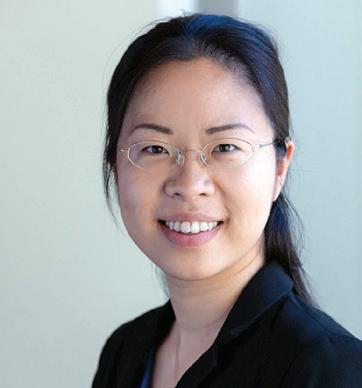
“Innovation, Productivity, Growth: Economic Business and Finance Perspectives” will be held in the Murray Room of the Yawkey Athletic Center. Ma will kick off the all-day event with her talk, “Monetary Policy and Innovation, Implications for Long-Term Economic Growth,” following welcoming remarks by Economics Chair Christopher F. Baum.
“The pandemic and post-pandemic business and financial market cycle proved to be uniquely challenging,” said conference coordinator Brian Bethune, a professor of the practice in economics. “What was remarkable was the amazing ability of workers and businesses across the spectrum to innovate and adjust to a rapidly changing environment. Worker productivity saw major gains early in the expansion, paused, and then reenergized in the second and third quarters of 2023. After a brief burst in 2022, inflation declined sharply.
“This conference is designed to bring
into focus unique opportunities to build sustainable, low-inflation growth in 2024 and beyond, by supporting and leveraging path-breaking innovations.”
An associate professor of finance at the UChicago Booth School of Business, Ma spoke at last month’s Jackson Hole Economic Symposium immediately following Federal Reserve Chair Jerome Powell’s keynote address. Ma, who earned a doctorate in business economics from Harvard University, researches topics such as debt contracts and macroeconomic implications; assets and production activities of nonfinancial firms; low interest rates and financial markets, and expectations in finance and macroeconomics. She also serves as a faculty research fellow at the National Bureau of Economic Research, and a research affiliate at the Center for Economics and Policy Research.
The morning’s opening panel, “The ‘Big Picture’ in the U.S.,” will be moderated by Jeffrey C. Fuhrer, foundation fellow at the Eastern Bank Foundation, and a former executive vice president at the Federal Reserve Bank of Boston. Panelists include Professor Susanto Basu, director of graduate studies in the Economics Department; Christopher Foote, a senior economist and policy advisor at the Federal Reserve Bank of Boston; and
Jay Stewart, a senior research economist at the U.S. Bureau of Labor Statistics’ Division of Productivity Research and Program Development.
Morgan Stanley First Vice President Craig Slater will moderate a mid-day discussion on the evolving operational challenges and prospects for the accelerated adoption of new innovations, such as machine learning, clean energy, and automation. He will be joined by Suffolk Construction Chairman and CEO John F. Fish, a Boston College trustee; John Deere Inc. Director of Corporate Economics Kanlaya
Barr; Caitlin R. Brumme, CEO of Bostonbased non-profit MassChallenge; Colleen Gallahue ’11, vice president of alternatives lending fund finance at State Street; Adam A. Valkin, a managing director at venture capital firm General Catalyst; and Eleanor Dillon, principal economist at Microsoft Research Lab in Cambridge.
Boston Business Journal Executive Editor Douglas Banks will moderate “Looking Under the ‘Economic Hood,’” which will discuss different aspects of productivity dispersion across establishments within the manufacturing industries. Panelists include Amherst College Assistant Professor of Economics Jake Blackwood, and Cindy Cunningham and Jay Stewart of the U.S. Bureau of Labor Statistics’ Division of Productivity Research and Program Development.
The symposium closes with a “Advancing the Frontiers of Innovation: Energy & Materials,” moderated by Nasir Khilji, a retired senior economist at the U.S. Department of the Treasury. Panelists include BC Assistant Professor of Chemistry Alexis Grimaud, an expert in energy storage; Department of Energy Bioenergy Technology Senior Analyst Zia Haq; and Sam Wurzel, an advisor at the U.S. Department of Energy Advanced Research Projects Agency.
To register for the symposium, go to https://bit.ly/BC-Economics-Symposium-2023
September 14, 2023
Diana Bowser
photo by lee pellegrini
Keynote speaker Yueran Ma
4 Chronicle
GEST
Continued from page 1
of Jesuit Universities held at BC—for Jesuit institutions to promote solidarity and collaboration both within and outside the university for the greater good.
“We are seeking to promote a model of engaged scholarship,” said Owens, a professor of the practice in the Theology Department. “The idea behind GEST is for it to have an impact on teaching, mentoring, research, and writing that will reach well beyond the participating colleges and universities.”
Housed in the Office of Global Engagement, GEST works closely with the Schiller Institute for Integrated Sciences and Society and the International Studies Program.
The working group on Climate Change and Migration will examine how climate change exacerbates environmental, political, and economic factors that drive migration in complex ways, at a time when more than 100 million people are forcibly displaced from their homes, 35 million of whom are forced from their own country.
BC faculty joining Young will be BC School of Social Work Salem Professor in Global Practice Theresa Betancourt; Earth and Environmental Sciences Chair Noah Snyder; Walsh Professor of Bioethics and Theology Chair Andrea Vicini, S.J.; and Professor of Earth and Environmental Sciences Hanqin Tian, the Schiller Institute Professor of Global Sustainability.
Also in the group are Philippine Undersecretary of Finance Maria Luwalhati (Alu) Dorotan Tiuseco, a faculty member in the School of Law at the Ateneo de Manila; Oscar Melo, an associate professor in agricultural and resource economics in the School of Agronomy and Forest Engineering at Pontificia Universidad Católica de Chile; and Anne McDonald, a professor in the Graduate School of Global Environ-
mental Studies and director of the Island Sustainability Institute at Sophia University in Tokyo.
“There may be no ethical challenge more immense than that wrought by our changing, and in some places now unlivable, climate,” said Young. “Migration due to environmental degradation or extreme weather events is often forced on the world’s most vulnerable people, who are least responsible. I look forward to the insights that will come in bridging the environmental and earth sciences, ethics, human rights, social work, and law.”
The Democracy, Governance, and Education group convenes amidst a backdrop of decreasing trust in—and threats by populist and authoritarian movements against—democratic norms and institutions around the world.
In addition to Laurence, BC members include Libby Professor of Law and Theology M. Cathleen Kaveny; Professor of History Martin Summers, who teaches in the African and African Diaspora Stud-
ies, Women’s and Gender Studies, and Medical Humanities, Health, and Culture programs; Associate Professor of English Angela Ards, director of the BC journalism program; and Associate Professor Chris Higgins, chair of the Formative Education Department in the Lynch School of Education and Human Development.
Rounding out the group are Linda Hogan, a professor of ecumenics in the Trinity College Dublin School of Religion; Francisco de Roux, S.J., who was honored for his work in chairing Colombia’s Commission for the Clarification of Truth, Coexistence, and Non-Repetition, and served as BC’s Gasson Professor during 20222023; Nelson Ribeiro, dean of the faculty of human sciences and coordinator of the doctoral program in communication studies at Universidade Catolica Portuguesa; and Elias Omondi Opongo, S.J., director of Kenya’s Hekima University College of Peace Studies and International Relations.
“As scholars, we are caught up in disciplinary debates and theoretical contri-
butions to our fields, even while we may privately worry about democracy’s future worldwide,” said Laurence. “I welcome the chance to have concrete discussions about ‘what we should do’ with an informed and diverse array of viewpoints. How can we best prepare democratic citizens for a lifetime of deliberation and debate? Our first step will be to set the scope of our ambitions and a realistic timeline for our work. We don’t need to solve everything at once, but we can identify and help tailor ideas and programs that have worked here and around the world and that have been shown to improve the quality of participatory democracy.”
At the core of GEST is a commitment to ethical reflection and action in response to the decline of social trust across many societies around the world. Social trust, Fr. Keenan said, is “the degree to which people have faith in the good will and mutual regard of their civic neighbors and the sound functioning of their society’s institutions.” Although necessary for the functioning of social life, he said, that social trust has been compromised locally, nationally, and globally by sources as various as populism, inadequate government responses to the COVID pandemic, the sexual abuse crisis in the Catholic Church, and the spread of fake news on social media.
The ethics component is woven tightly into the process, said Owens: “Although several of our faculty participants are specifically trained in theological ethics, all of us are committed to reflecting on the ethical dimensions of our work. An ethical conversation is, above all, a human conversation—not just a matter of being a specialist or an expert. GEST is a formative enterprise for the faculty who participate, an opportunity to integrate their scholarship and teaching in ways that build social trust in the service of addressing these crucial issues.”
For more about the Global Ethics and Social Trust program, see bc.edu/global-ethics
Leadership Change in Walsh Ctr. for Thriving Children
BY PHIL GLOUDEMANS STAFF WRITER
Eric Dearing, a professor of applied developmental psychology in the Lynch School of Education and Human Development, has been named the executive director of the Mary E. Walsh Center for Thriving Children, announced Stanton E.F. Wortham, the Charles F. Donovan, S.J., Dean of the Lynch School. The appointment is effective immediately.
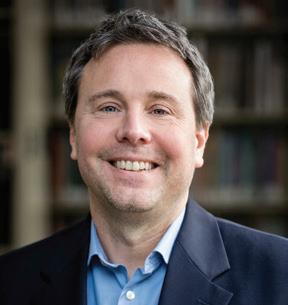
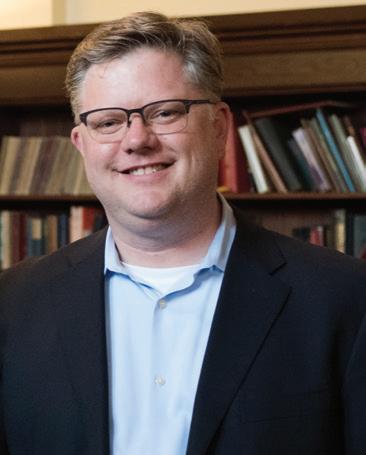
A member of the Counseling, Developmental & Educational Psychology Department, Dearing succeeds the namesake founder, who launched what was previously called the Center for Optimized Student Support in 2001. Through an anonymous $10 million gift, the center was renamed the Mary E. Walsh Center for Thriving Children (CTC) in February 2022 to honor her. Walsh, who retired from teaching in 2022, will serve as a CTC senior fellow and continue to lead the Lynch School’s City Connects, an international, comprehensive student support program.
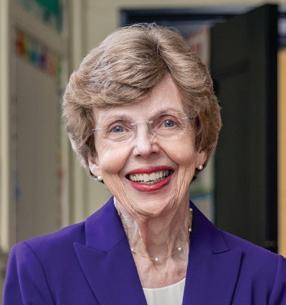
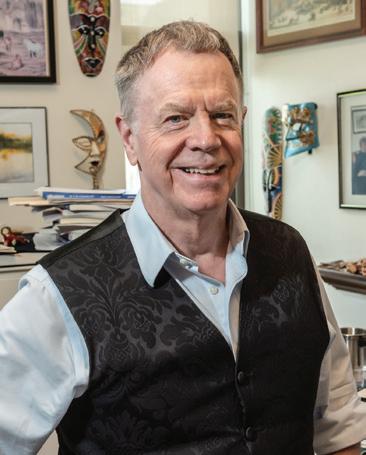
Additionally, Wortham announced that Claire Foley will continue as CTC associate director.
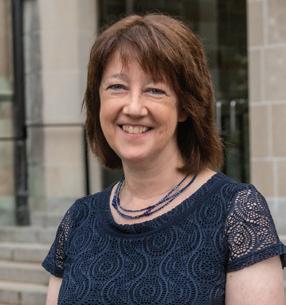
“Mary Walsh did extraordinary work in launching City Connects and founding the center that now bears her name,” said Wortham. “We are thrilled that Eric Dearing will now assume the leadership of the center. He has exactly the right combination of research acumen, vision, commitment, and networking skills. Eric, Claire, and Mary make an outstanding leadership team, and they have already developed a compelling vision
for achieving even greater impact through the center’s work.”
Dearing, a Lynch School faculty member since 2006, is an expert in the links between students’ lives outside of school and their classroom performance. His research emphasizes the power of families, early education and care, and neighborhood supports to bolster achievement for children raised in poverty. Much of his recent work centers on promoting high-quality parent and early educator engagement to improve math learning for children from low-income families.
Dearing earned a doctorate in psychology from the University of New Hampshire, served as a post-doctoral fellow at the Harvard Graduate School of Education, and as an assistant professor in the Department of Psychology at the University of Wyoming, as well as a senior researcher/visiting professor at the University of Oslo. He is a member of the Development and Research in Early Math Education network, and was named a Foundation for Child Development Young Scholar awardee, and a National Academy of Education/Spencer Foundation Postdoctoral Fellow.
September 14, 203
Erik Owens, left, and James Keenan, S.J., are the director and principal investigator, respectively, for the newly launched Program in Global Ethics and Social Trust.
photos by peter julian and lee pellegrini
(L-R) Eric Dearing, Mary Walsh, Claire Foley
photos by caitlin cunningham and lee pellegrini
5 Chronicle
Ross: U.S. Investment in China to Remain ‘Robust’
tal approach, allowing for ongoing analysis of the effect of incremental policy adjustments before implementing additional measures. This is how the U.S. Federal Reserve Bank has responded to U.S. inflation. Thus far, China has provided support to troubled sectors, reduced its banks’ reserve requirements to encourage lending, and supported the stock market. Should these measures prove insufficient, I would expect additional measures.
Ross: Despite the name of the Chinese ruling party, ideology has long been irrelevant in Chinese politics. Neither Marxism nor Maoism play a role in policy making. Rather, the political instincts of the Chinese Communist Party leaders are similar to those of leaders of other authoritarian parties: maintain absolute authority over the country. The foremost political factor in economic policy making is the Chinese Communist Party’s priority on assuring its control over the economy to keep itself in power. The fate of the Communist Party of the Soviet Union continues to haunt Chinese policymaking. In recent years, the party has increased its control over the economy by strengthening the role of stateowned enterprises in the economy, at the expense of the private sector investment. This has been detrimental to both economic growth and innovation.
Q: American companies are accelerating efforts to reduce their dependence on Chinese suppliers, citing a 24 percent reduction in Chinese imports during the first half of this year versus 2022, and Mexico is now emerging as the U.S.’s top trading partner. What is driving this supply chain transformation?
It is also important to note that the decline in China’s growth rate reflects the decline in both international and domestic consumption. The global recession has contributed to a dramatic decline in Chinese exports. Exports will increase, and thus GDP growth will improve, once the global economy recovers from the recession. Domestic consumption has also declined as domestic savings have increased, because the Chinese people lack confidence in the post-COVID Chinese economy and because their savings have declined with the decline in real estate values. Over time, domestic consumption will also rebound, contributing to growth.
On the other hand, there are structural problems in the Chinese economy that constrain growth and that require the leadership’s attention. These problems include declining private sector confidence in government support and low labor productivity. There remains considerable uncertainty whether these issues will be addressed.
Q: What role does Communist Party ideology play in the efforts to revive China’s sagging economy? Isn’t China risking prolonged stagnation by either stalling or failing to boost output by implementing stimulus programs and/or welfare policies common in the U.S. and Europe?
Ross: The combination of China’s changing political environment and U.S. policy toward China has cautioned American companies from relying on their investments in China for continued growth. On the one hand, China says that it welcomes foreign investment. But its retaliation against U.S. controls over technology cooperation with China and China’s increase focus on self-reliance suggests that there is now greater political risk for corporate investments in China. The downward trend in U.S.-China relations suggests that both U.S. and Chinese controls over U.S. investments will increase and challenge long-term profitability. This trend contributes to corporate efforts to diversify supply chains.
Nonetheless, U.S. investment in China will remain robust. For most companies, there are few alternatives to investment in China. India and Vietnam, for example, lack the transportation and energy infrastructures, as well as an adequate technology-capable work forces, to support reliable production processes and timely deliveries. Also, the Chinese market is too attractive to sacrifice in the interest of significant corporate “decoupling.”
Q: U.S. Secretary of Commerce Gina Raimondo recently assured Chinese officials that the U.S. was not seeking to sever economic ties with China, but expressed a litany of concerns—such as intellectual property theft, raids on businesses, a new counterespionage law, and exorbitant, unexplained fines—that has prompted the American business com-
“China’s slow labor productivity reflects its inability to introduce advanced technologies into production. If Chinese policy can encourage greater investment in manufacturing technologies, its economy would continue to grow at an impressive rate. It is unlikely that China will fully transform its economy, but even a moderate improvement in productivity would offset any decline in the birth rate.”
munity to describe China as too risky and “uninvestable.” Are the challenges that the U.S. faces in reviving this relationship insurmountable, or is there a path forward?

Ross: U.S.-China diplomacy will not ease U.S.-China relations. The downward trend in relations does not reflect misperceptions or a lack of dialogue. Rather, it reflects U.S. resistance to the rise of China and U.S. policy responses. The sources of tension are U.S. technology controls, ongoing U.S. trade war tariffs against China, U.S. policy toward Taiwan, and U.S. strengthening of its security partnerships on the Chinese maritime perimeter. China’s response has included its pressure on American companies in China, as well as in its economic and military pressure on Taiwan and its effort to weaken U.S. security partnerships in Asia. Diplomacy cannot alter this dynamic. For China and the United States, diplomacy is merely an effort to establish each side’s “reasonableness.” Each country knows this about the other. Short of an economic implosion and the end of its rise, there is nothing China can do to alter U.S. policy and, thus, the downward trend in relations.
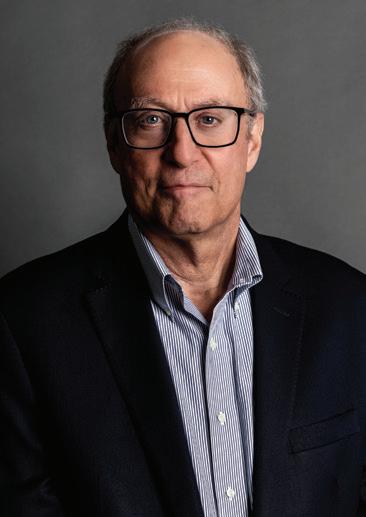
Q: The biggest problem facing China is its population decline: approximately 850,000 from 2021 to 2022, confirm-
ing what demographers had previously estimated. Why are birth and fertility rates falling? What are the long-term impacts of these demographic changes?
Ross: China’s birth rate has significantly declined and over time the size of its workforce will also decline. But the constraints on Chinese economic growth have little to do with Chinese demographic trends. With a population of 1.4 billion, China has plenty of people to staff its workforce. The issue is not the size of the workforce, but the low productivity of Chinese workers. By some measures, Chinese labor productivity is one-fourth the productivity of U.S. labor productivity; the U.S. economy is larger than the Chinese economy, despite having one-fourth the population of China.
China’s slow labor productivity reflects its inability to introduce advanced technologies into production. If Chinese policy can encourage greater investment in manufacturing technologies, its economy would continue to grow at an impressive rate. It is unlikely that China will fully transform its economy, but even a moderate improvement in productivity would offset any decline in the birth rate.
—Phil Gloudemans
September 14, 2023
Continued from page 1
Robert Ross
photo by caitlin cunningham
photo
source: wikimedia commons
The Great Wall of China, Badaling
6 Chronicle
Bloechl Is New Fitzgibbons Chair, Succeeding Fr. Madigan

Continued from page 1
interpreter of the thought of Emmanuel Levinas, Bloechl is the author of the recently published Levinas on the Primacy of the Ethical: Philosophy as Prophecy and is the founding series editor of Levinas Studies: An Annual Review and Thresholds in Philosophy and Theology.
“I am delighted that Jeff Bloechl will be serving as the Albert J. Fitzgibbons Chair in Philosophy,” said Fr. Kalscheur. “The terms of the Fitzgibbons gift state that ‘the Chairholder’s work [will] help [to] engage contemporary philosophical and ethical issues facing society.’ Jeff’s longstanding commitment to scholarship that addresses the relationship between claims for religious meaning and various features of human nature that place pressure on them make him a fitting holder of this endowed chair.
“His research has made significant contributions to a distinctively Catholic approach to philosophy, and he is deeply committed to formative Jesuit education,” added Fr. Kalscheur. “Jeff’s way of proceeding as teacher and a colleague is distinctively characterized by cura personalis; he is a quiet and steady presence with students at both the undergraduate and graduate levels. All of these qualities make him an ideal selection to succeed Arthur Madigan, S.J., as the Fitzgibbons Chair in Philosophy.”
“It is an honor for me to receive the Fitzgibbons Chair, which has played an important role in the intellectual life of our Philosophy Department and beyond,” said Bloechl. “I hope to continue that tradition, doing my best to put the resources of this chair to the service of the University and its students.”
The Fitzgibbons Professorship was established in 2007 by Albert J. “Trey” Fitzgibbons III ’67.
At Boston College, Bloechl has taught both undergraduate and graduate students. Recent courses have included The Problem of Suffering; The Hermeneutics of Faith, Hope and Love; and Love of Learning and Desire for God. Ten years ago, he founded an annual course that includes a two-week pilgrimage in northern Spain. Long in the habit of putting his research and teaching into contact with other cultures, he has taught in Belgium, Brazil, India, Italy, and Lithuania and is an Honorary Professor of Philosophy at Australian Catholic University.
Bloechl is married to Newton College
Alumnae Chair of Western Culture Catherine Cornille of the Theology Department. They are the parents of three children, including two graduates of Boston College.
BC in the Media
Donald Trump’s insurrection should disqualify him for office, wrote Prof. Mark Brodin (Law) in an op-ed for Commonwealth Magazine on the constitutional provision designed to prevent Confederate soldiers from resuming office after the Civil War.
Cultivating connection and community in the workplace makes for happier, healthier, and more productive employees, Prof. David Blustein (LSOEHD) explained in an interview with APA.org.
Prof. Alfred Yen (Law) offered comments to The Hill on the apparent readiness of Congress to impose guardrails around NIL (name-image-likeness) deals for studentathletes.
The complexities of France’s riots earlier this summer deserve a deeper dive than
Nota Bene
Melodie Wyttenbach, executive director of the Barbara and Patrick Roche Center for Catholic Education at the Lynch School of Education and Human Development, was one of three recipients of the Magis Medal, awarded annually by Alpha Sigma Nu, the honor society of

Jobs
The following are among the recent positions posted by the Department of Human Resources. For more information on employment opportunities at Boston College, see www.bc.edu/jobs or scan the QR code at right.

Assistant Director, Corporate Sponsorships
Assistant/Associate Director, Parent Leadership Giving
Software Release Analyst
Patrol Officer
Dining Services Assistant Manager
Content Development Specialist
Resident Director
Research Assistant
Assistant Director, Graduate Career Services
Life Skills Coordinator
Public Safety Dispatcher
Staff Psychologist or Staff Social Worker/Clinician
Design & Prototyping Manager
Procurement and Vendor Specialist
Assistant Director, Housing Operations
Teacher Assistant
what is often depicted by buzzwords, Prof. Franck Salameh (Eastern, Slavic, and German Studies) wrote in a piece for the Hoover Institution Caravan Notebook.
Drinan Professor of Law Thomas W. Mitchell, director of the Initiative on Land, Housing, and Property Rights, discussed how, throughout American history, land was taken from Black families—and what can be regained—in an interview with WCVB-TV “CityLine.”
In an interview with The New York Times, Assoc. Prof. David Hopkins (Political Science) weighed in on how the Democratic party and electorate have, and have not, changed in recent years.
Prof. Ray Madoff (Law), founder of the school’s Forum on Philanthropy and the Public Good, commented on the social justice movement in philanthropy in an interview with NonProfit Times.
Jesuit colleges and universities, to graduates who embody their Jesuit roots in their daily work. An alumna of St. Louis University, Wyttenbach was cited for her efforts to transform and strengthen Catholic schools. She was named Roche Center executive director in 2019.
Speech & Language Pathology Assistant
Assistant or Associate Director, Organizational Effectiveness
Service Center Representative, School of Theology & Ministry
Facilities Assistant
Assistant Director, Admissions
Research Technician
Assistant Director, Counseling Practicum Experience
Nurse Practitioner
Post-doctoral Research Fellow (multiple positions)
September 14, 203
“[Bloechl’s] research has made significant contributions to a distinctively Catholic approach to philosophy, and he is deeply committed to formative Jesuit education.”
—Morrissey College Dean Gregory Kalscheur, S.J.
Snapshot
Mass of the Holy Spirit
photos by caitlin cunningham
7 Chronicle
The annual Mass of the Holy Spirit took place inside Conte Forum on September 7, due to extremely hot weather. University President William P. Leahy, S.J., celebrated the Mass with homilist Claudio Burgaleta, S.J., rector of the Boston College Jesuit Community.
BC Research
Schiller Institute Announces Faculty Grants
Environmental history, household water purification, wind energy among projects being funded
BY ED HAYWARD STAFF WRITER
The Schiller Institute for Integrated Science and Society has awarded grants totaling approximately $500,000 to 15 faculty projects focused on areas of energy, the environment, health, and faculty collaboration, institute Seidner Family Executive Director Laura J. Steinberg recently announced.
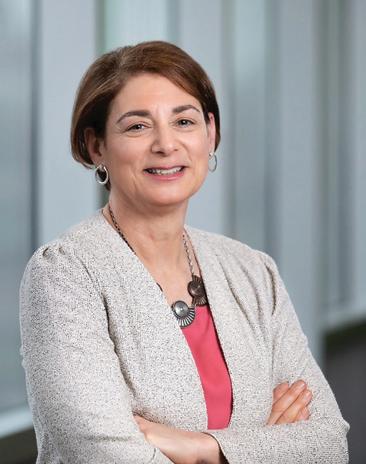
This round of grant-making marks the third year of the institute’s Grants for Exploratory Collaborative Scholarship (SIGECS) and the inaugural round of a new tier of grants called Research in Targeted and Emerging Areas (SI-RITEA).
“The popularity of the program, and the tremendous quality of the proposals we receive, is indicative of the hunger for faculty and students to engage in meaningful, intellectual activity with each other,” said Steinberg. “With so many of the projects resulting in impacts beyond campus, we are demonstrating the commitment that the BC campus has to engage with the world and help to make real change in the lives of people outside of campus.”
From 30 applications to the two programs, funding went to five SI-GECS proposals and 10 SI-RITEA proposals. The institute awarded one Type 1 SI-GECS grant and four Type 2 grants, which provide as much as $50,000 per award to support a graduate research assistant.
The new SI-RITEA initiative focuses on two different types of grants. Six Type A grants were awarded to support scholarship focusing on the natural environment, health and well-being, or the energy transition as experienced in the Global South. Four Type B grants were awarded to sup-
BC Scenes
First Year Academic Convocation
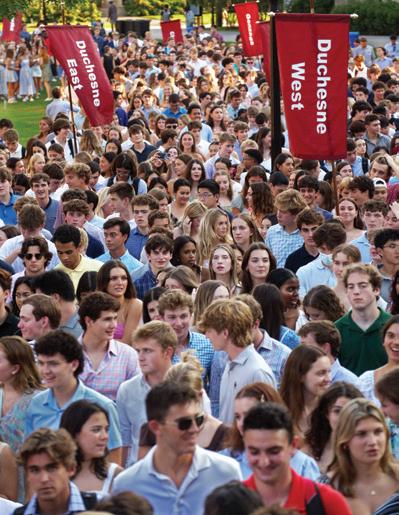
port projects on environmental or climate justice, environmental health, sustainability, or renewable energy in collaboration with an external partner.
“The SI-GECS program has been very successful and we’re very proud of the accomplishments of those grantees,” said Steinberg. “At the same time, I could sense that there was a desire on campus for additional internal funding opportunities. In addition, we’ve been able to hone in on specific focus areas for the institute with the hiring of our first three core faculty members. Working with our core faculty helped me decide that two areas of growth for Schiller would be exploring societal issues as experienced in the Global South and developing strong relationships with community partners.”
Type B grants must include collaboration with a United States-based, non-academic partner, such as a non-governmental organization, business, or government entity, according to Steinberg. Collaborations with Massachusetts partners are encouraged.
For example, Professor of History Conevery Bolton Valencius’s project will
partner with the Neponset River Watershed Association and the Institute for New England Native American Studies at University of Massachusetts-Boston on a project examining the environmental history of the lower Neponset River, along the southern boundary of the City of Boston.
Compared to SI-GECS, the SI-RITEA program looks for projects that have more specific focus areas, and faculty are not required to have a collaborator on the project. SI-GECS projects require at least two BC faculty who must be from different disciplines.
The SI-RITEA grantees are required to participate in two roundtable meetings each semester. The purpose of the meetings is to share research progress, discuss areas of common interest, and formulate plans for potential future work.
Examples of the SI-RITEA awards include Assistant Professor of Engineering Ali Salifu’s “Ceramic water filters for household water purification in limited-resource settings,” which will involve work with communities in his native Ghana.
“This project aims to develop the next generation of ceramic water filters that concurrently remove bacteria, viruses, protozoa, and heavy chemicals from water in a way that addresses the potential barriers to implementation, namely: the cost of ownership and the rate at which the filters break,” Salifu wrote.
Of the SI-RITEA proposals, Steinberg said, “I am thrilled with the variety of countries, continents, and organizations that the faculty and students are working with. Most are partnering with local organizations who will help us translate our efforts for immediate impact. The ambition of our faculty to get connected with people and communities all over the world is inspiring.”
During the first two years of the SIGECS initiative, 15 projects received funding totaling $410,000 in 2021 and last year 12 projects received funding that added up to approximately $420,000.
The inaugural round of SI-GECS grants has produced a range of scholarly output, Steinberg said. From the first cohort, 19 papers have been published, project investigators submitted 24 applications for external funding, with 14 proposals yielding funding of $3.25 million. Additionally, researchers made 84 presentations in a variety of settings. The projects trained more than 40 undergraduate and graduate students and postdoctoral fellows.
Steinberg said she is just as excited about this year’s class of SI-GECS recipients.
“We have some of the best scientists on campus working with each other on issues of critical importance,” she said. “For example, I am thrilled that we are able support Lynch School of Education and Human Development Associate Professor Betty Lai and Associate Professor of Communication Mo Jones-Jang’s collaborative work on the public communication of scientific discovery, and the work of Associate Professor of Economics Rich Sweeney and Professor of Eath and Environmental Sciences [and Schiller Core Faculty Professor] Yi Ming on the challenges of developing wind energy capacity.”
Full descriptions of all projects are available at the Schiller Institute website [www. bc.edu/schiller]
Unseasonably warm weather greeted the Class of 2027 on September 7 as they took part in the First Flight procession from Linden Lane to Conte Forum, where they—along with University President William P. Leahy, S.J.—listened to author Tracy Kidder (far right), who also was the featured speaker at the first convocation in 2004.
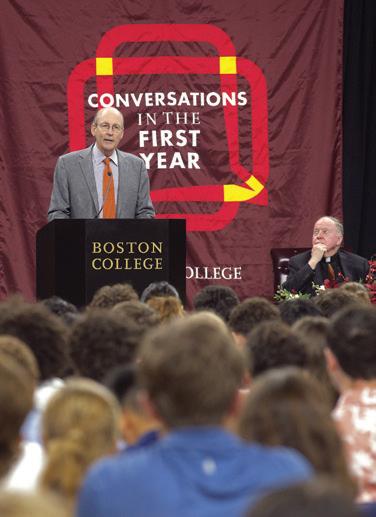
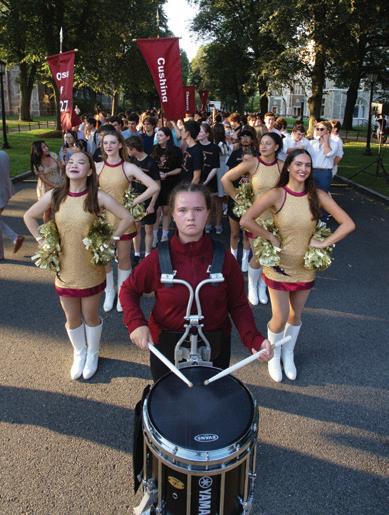
September 14, 2023
Laura Steinberg, Seidner Family Executive Director of the Schiller Institute: “The popularity of the [grants] program, and the tremendous quality of the proposals we receive, is indicative of the hunger on campus to engage in meaningful, intellectual activity with each other.”
photo by marilyn hesler
PHOTOS BY LEE PELLEGRINI
8 Chronicle












 BY JOHN SHAKESPEAR SPECIAL TO THE CHRONICLE
BY JOHN SHAKESPEAR SPECIAL TO THE CHRONICLE














